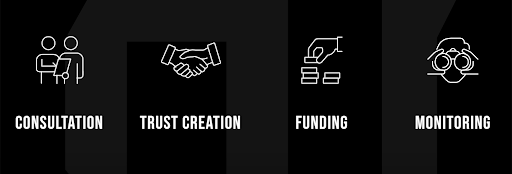Quick Summary
Asset protection shields wealth from lawsuits, creditors, and financial risks through strategies like offshore trusts, LLCs, and foreign bank accounts. This article explains how asset protection works, compares it to estate planning, and details the key benefits including financial stability and lawsuit protection. Learn about implementation steps, from risk assessment to ongoing monitoring, and discover how Blake Harris Law can help structure your protection plan.
Looking to Learn More about Asset Protection?
Asset protection is crucial for everyone—not just the super wealthy. Even individuals earning under $200,000 annually face increasing risks from lawsuits and legal claims. Understanding how to protect your assets from lawsuits, creditors, and unforeseen risks has never been more important.
In this Blake Harris Law guide, we’ll explain what asset protection is, how it can benefit you, and the specific strategies you can use to secure your financial future.
But first…
Why Listen to Us?
At Blake Harris Law, we create personalized asset protection strategies that secure your wealth and provide peace of mind.
We help clients protect their financial future using proven legal structures including offshore trusts, LLCs, and specialized plans for cryptocurrency holdings. Our approach prioritizes both strong legal protection and practical solutions that work for your specific situation.
What Is Asset Protection?
Asset protection uses legal strategies to shield your personal and business assets from lawsuits, creditors, and financial disputes. It works by creating structured barriers between your assets and potential threats while maintaining full compliance with legal and financial regulations.
At its core, asset protection separates your holdings from liability exposure. Key methods include:
- Trusts: Offshore trusts in jurisdictions like the Cook Islands or Nevis use strong debtor protection laws to shield assets from legal claims.
- Limited Liability Companies (LLCs): These create a legal separation between personal and business assets, limiting your exposure to business-related claims while maintaining operational flexibility.
- Offshore Accounts: Strategic use of certain jurisdictions’ laws provides enhanced protection from domestic claims.
Asset protection is best implemented before legal issues arise – waiting until a dispute emerges severely limits your options. Early planning ensures maximum protection and legal compliance.
Whether you are protecting family wealth, business interests, or cryptocurrency holdings, proper asset protection provides long-term security and stability.
Asset Protection vs. Estate Planning
While asset protection and estate planning both help manage wealth, they differ in several fundamental ways:
- Purpose: Asset protection shields your wealth from lawsuits and creditors during your lifetime. Estate planning ensures smooth transfer of assets after death.
- Timing: Asset protection works while you are alive, protecting your current wealth from threats. Estate planning focuses on managing wealth transfer and legacy after you pass away.
- Tools: Asset protection uses trusts, LLCs, and offshore accounts to create legal barriers around your wealth. Estate planning employs wills, powers of attorney, and living trusts to guide future asset distribution.
Benefits of Asset Protection
Shielding Wealth from Legal Claims
A strong asset protection plan makes your wealth much harder for creditors to reach. This is not about hiding assets – it’s about using legal structures to create legitimate barriers against lawsuits and claims.
Here’s how:
- Offshore Trusts: Places like the Cook Islands or Nevis have laws that strongly favor asset protection. If someone sues you, they will have to fight their case all over again in these countries’ courts—a process so expensive and time-consuming that most creditors give up.
- Limited Liability Companies (LLCs): An LLC keeps your personal assets separate from your business. Many clients create multiple LLCs—for example, putting each rental property in its own LLC means problems with one property will not put the others at risk.
- Homestead Exemptions: Your home often gets special protection. Some states like Florida and Texas may protect your entire home value from creditors.
Remember—timing matters. Set up these protections before you need them. Courts look more favorably on long-term asset planning than last-minute attempts to protect wealth.
Preserving Financial Stability
Asset protection helps you maintain financial stability even when facing unexpected challenges like lawsuits or business setbacks. A well-designed plan lets you keep control of your wealth while reducing your exposure to risks.
Here’s what to consider:
- Asset Segregation: Keep high-risk assets (like rental properties) in separate LLCs. This way, problems with one investment will not threaten your other holdings or personal wealth.
- Trust Structures: Irrevocable trusts can move assets out of your direct ownership while still preserving your ability to benefit from them. This creates a legal buffer between you and potential claims.
Proper planning gives you a financial safety net—you maintain access to your resources while protecting them from unexpected threats. The key is to start early, before any problems arise.
Ensuring Privacy and Confidentiality
The right asset protection structures keep your financial details private, reducing your visibility to potential lawsuits and claims. While you cannot hide assets from courts or creditors, you can legally limit access to your financial information.
Here’s how:
- Anonymous LLCs: States like Wyoming and Delaware let you form LLCs without publicly listing your name. This keeps your business holdings private while staying fully compliant with the law. However, a court can always order you to disclose your assets.
- Offshore Trusts: Many offshore jurisdictions have strict privacy laws that shield trust details during litigation. This makes it harder for potential creditors to map out your assets before filing a lawsuit.
These privacy tools do not just protect your wealth—they often prevent lawsuits from happening in the first place. When your assets are harder to find, opportunistic lawsuits become less likely.
How Does Asset Protection Work?
1. Assess Risks
The first step in asset protection is understanding what you need to protect against. This means taking a clear look at potential threats to your wealth—including:
- Personal Exposure: Consider risks like divorce, personal guarantees on loans, or unpaid debts that could put your personal assets at risk.
- Business Liabilities: Look at risks from your business operations, including contracts that could go wrong, potential employee disputes, or regulatory compliance issues.
- Future Challenges: Think about changes that could create new risks, like shifts in laws, market conditions, or your personal circumstances.
At Blake Harris Law, we help identify these risks during your initial consultation. Understanding your specific situation lets us create a protection plan that actually works for your needs and goals without making sacrifices.
2. Structure Assets
The core of asset protection is creating legal barriers that separate your wealth from potential claims.
This means carefully placing your assets into protective structures like offshore trusts, LLCs, and foreign accounts. Each structure needs to serve a clear purpose while working together as part of your overall plan.
We focus on implementing these strategies in full compliance with legal requirements while maximizing your protection. Our experience helps ensure your asset structure can withstand legal challenges and adapt to changing financial risks.
3. Ongoing Monitoring and Adjustments
Asset protection is not a one-time task. As your life changes, your protection plan needs to keep up. Regular reviews help ensure your strategies stay effective against new risks and take advantage of changing laws.
Here’s what we track at Blake Harris Law:
- Annual Reviews: We check if your current protections still match your assets and risks.
- Legal Updates: We adjust your structures when laws change.
- Risk Assessment: We watch for new threats from business changes or market shifts.
We stay on top of these details so you do not have to. Our ongoing monitoring ensures your asset protection evolves with your needs, keeping your wealth secure for the long term.
Our Asset Protection Strategies
Offshore Trusts
Offshore trusts are a cornerstone of asset protection. By establishing trusts in jurisdictions like the Cook Islands, Nevis, or Belize, we leverage legal systems with robust debtor protection laws. These jurisdictions provide significant barriers against domestic creditors, often requiring plaintiffs to overcome challenging legal hurdles.
Offshore trusts also allow for greater flexibility in safeguarding a variety of assets, including real estate, investments, and liquid funds. Properly structured, these trusts are an effective way to maintain control over your wealth while minimizing exposure to legal claims.
Limited Liability Companies (LLCs)
LLCs play a critical role in separating personal and business assets. By forming LLCs, we help clients protect their personal wealth from business liabilities, lawsuits, or debts. Assets held within LLCs are insulated from personal claims, creating a firewall between personal and professional risks.
Additionally, jurisdictions like Wyoming or Delaware offer enhanced privacy protections, ensuring that business holdings remain confidential. Our firm carefully recommends LLC structures to meet our clients’ specific financial and operational needs.
Professional Trustees and Trust Protectors
At Blake Harris Law, we emphasise the importance of appointing experienced professionals to oversee and manage trusts. Professional trustees and trust protectors ensure that trust terms are followed, assets are properly managed, and compliance with legal and tax obligations is maintained.
Trust protectors can make critical adjustments, such as replacing trustees or modifying trust terms to adapt to changing circumstances. This strategy ensures long-term asset security and effective governance while minimizing risks of mismanagement or legal challenges.
Our strategies, whether implemented individually or as part of a broader plan, provide a comprehensive approach to safeguarding wealth and ensuring financial security.
Trust Blake Harris Law for Asset Protection
Asset protection is essential for safeguarding wealth from legal threats, financial risks, and unforeseen circumstances. By using tools like offshore trusts, LLCs, and professional trustees, you can secure your financial future. For tailored solutions, turn to attorneys who specialize in this field, like us.
At Blake Harris Law, we offer a comprehensive approach to asset protection, combining personalized strategies with deep experience in offshore trusts, LLC formation, and ongoing asset management. Our team ensures your wealth is shielded effectively.
Contact Blake Harris Law today to secure your assets and protect your financial legacy.




